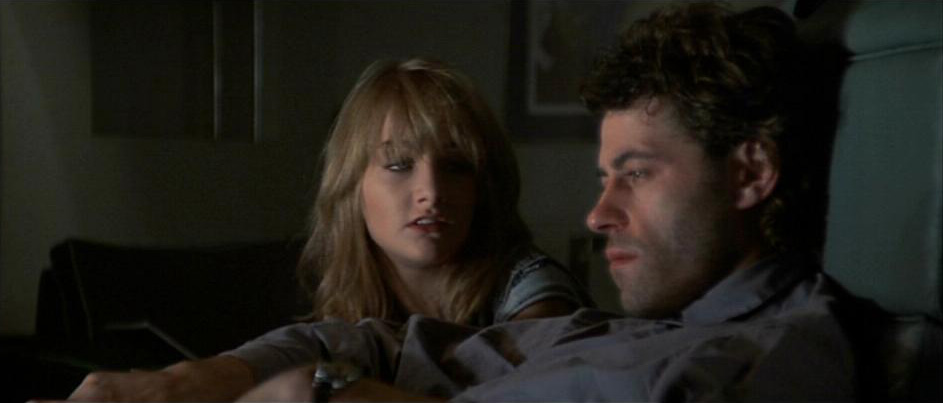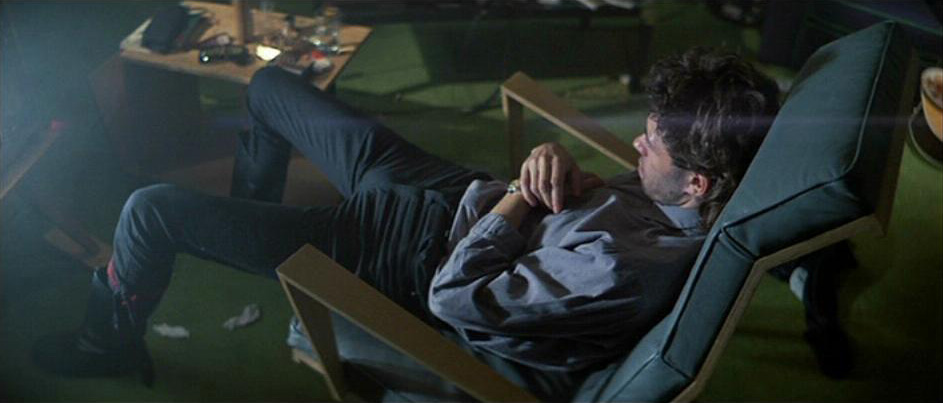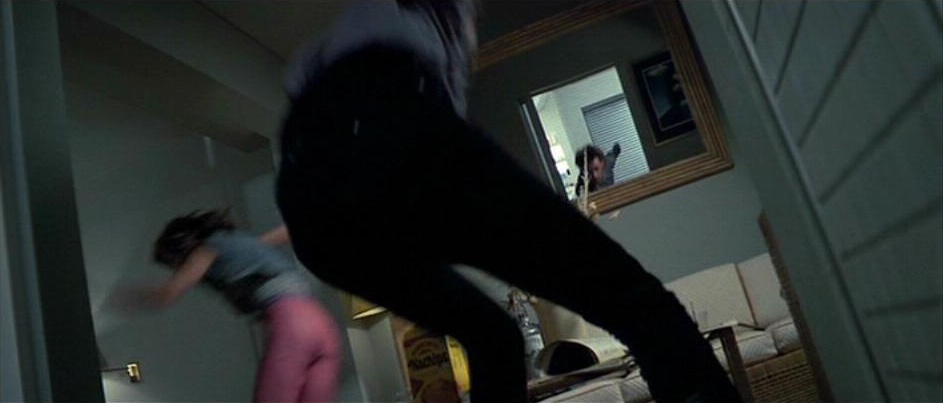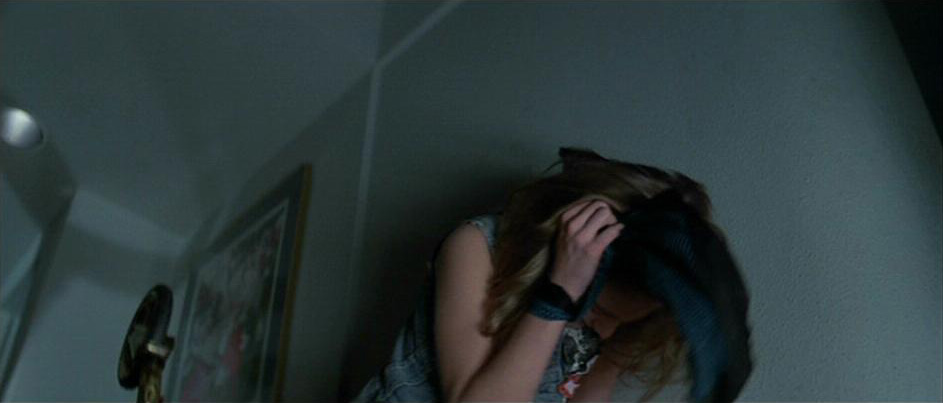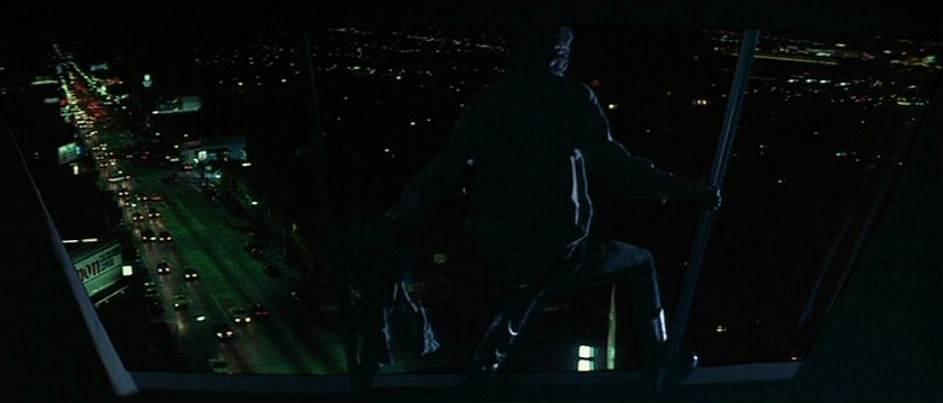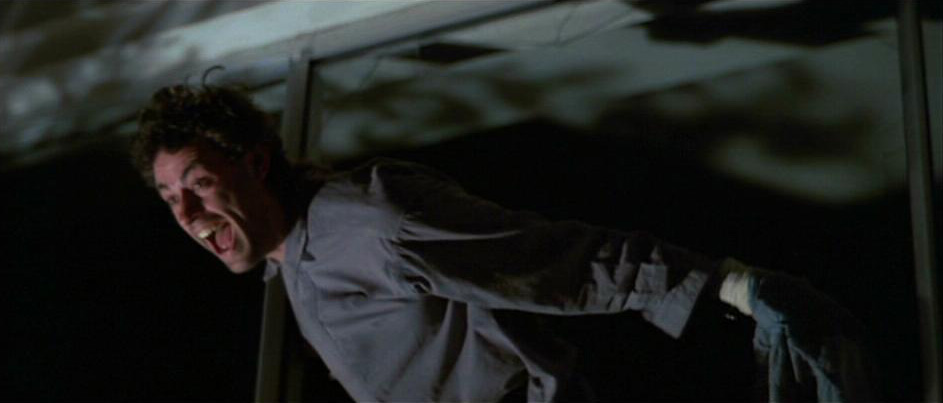One Of My Turns
[Roger Waters]Day after day love turns gray
Like the skin on a dying man.
And night after night we pretend it's all right.
But I have grown older, and
You have grown colder, and
Nothing is very much fun any more.
And I can feel one of my turns coming on.
I feel cold as a razor blade,
Tight as a tourniquet,
Dry as a funeral drum.
Run to the bedroom,
In the suitcase on the left
You'll find my favorite axe.
Don't look so frightened,
This is just a passing phase,
One of my bad days.
Would you like to watch TV?
Or get between the sheets?
Or contemplate the silent freeway?
Would you like something to eat?
Would you like to learn to fly?
Would ya?
Would you like to see me try?
Would you like to call the cops?
Do you think it's time I stopped?
Why are you running away?
Song In A Sentence:
Suspecting that his wife is having an affair, Pink invites a groupie back to his hotel room before emotionally erupting, destroying the room and chasing the groupie away.
A lthough we’ve always had glimpses of Pink’s darker side before this point in the album, “One of My Turns” gives us our first extensive view of the turmoil teeming just beneath the surface. Up until now, the album has been arguably dominated by the naivete of a young Pink growing (or at least trying to grow) into adulthood. Even the cynical, didactic tones of “In the Flesh?” and “the Thin Ice” are counterbalanced by a certain paternal, instructional quality. Beneath the gravity of the previous songs lurked a sense of exploring, of seeking self and searching for one’s place in the world no matter how misguided that search might be. While songs like “What Shall We Do Now?” and “Young Lust” portray Pink as exploring the physical pleasures of life, they portray searches nonetheless that insinuate the desire to grow. As we shall soon see, though, “One of My Turns” is the brick wall against which the naïve explorations of self and the world come to a crashing halt.
Following the young groupie’s quasi-theatrical ramblings concerning the expansiveness of Pink’s hotel room and possessions (the very sorts of materialistic bricks addressed in “What Shall We Do Now?”), Pink lapses into a trance-like state of personal reflection sparked by the discovery of his wife’s infidelity, and possibly further compounded by his inability to connect with the young girl he’s brought to his hotel suite. (Interestingly, the groupie is the only other character in the Wall aside from Pink who gets a voice of her own. All other characters are representations formed by Pink’s fractured psyche.) While the song’s later lyrics address the terrified fan, it is usually believed that Pink is mentally addressing his wife in the song’s calm first half. As mentioned in the analysis for “Young Lust,” it’s possible that Pink views the groupie as an extension of his wife and the femininity that he believes is constantly betraying him, thereby conflating the subjects of both his quieter musings and raving rants. In his 1979 interview with Roger Waters, interviewer Tommy Vance described Pink at this stage of the album as a man who has “got everything but nothing;” he’s got the celebrity status that most people can only dream of, adoring fans, expensive possessions, every worldly object that he could desire. However, he takes for granted what should be the most important thing in his life – a personal connection with his wife – the importance of which he only realizes once that love has been taken away. Yet even then he is blind to his own accountability in driving his wife to infidelity, instead turning his ire on what he sees as the fickleness of love and life. Similar to how he views every other disappointment in his life, Pink views the very connection that could have been his salvation as another personal betrayal unjustly heaped upon him as another brick in his wall. For the cynical Pink, this betrayal was eventual, the decay of his relationship unavoidable. Comparing the degeneration of love to the decomposition of a “dying man” and other natural processes (growing “older” and “colder”) dispels any personal blame that he might have felt. In his mind, everything in this world will decay and, at length, cause more harm than good. These ideas of degeneration are further implanted in the imagery of death, drugs and violence rounding out the song’s quieter first half in which he compares his feelings to a “razor blade,” a “tourniquet,” and a “funeral drum.” These last three similes can also be said to foreshadow the rest of the album’s action: The “razor blade” could very well insinuate Pink’s later turns to violence not only in the song, but also during his fascist phase. The “tourniquet” suggests Pink’s current drug use as well as the later injections that cause him to undergo another metamorphosis in “Comfortably Numb.” And finally, the mentioning of the “funeral drum” foreshadows his metaphorical death as he retreats completely behind his wall. Perfectly mirroring the transitory moment before Pink’s eruption, the tourniquet and funeral drum also carry with them the notions of being stretched almost to the breaking point. A tourniquet is drawn tight around a limb in order to hinder briefly the flow of blood through an artery (possibly symbolizing the cessation of Pink’s feelings and emotions) while the head of a drum must be drawn tight in order for sound to resonate throughout the hollow body (an apt metaphor for Pink’s shallow persona). In both instances, the imagery of being stretched so tightly prepares the audience for what must surely come soon: the breaking point.
The synthesizer crescendo stretches until it snaps, spewing forth all the emotions that Pink has hitherto kept at bay. In an instant, he turns on the terrified groupie, possibly because he sees her as a substitute for his wife and her adulterous actions, possibly because she represents the very superficial life in which he had invested so much. Just as he blames his wife and love in general for the atrophy of his relatioship in the song’s first half, in the second half he seemingly blames the groupie for being impressed by the materialistic excesses of fame that he’s embraced. Almost point for point, Pink sarcastically reponds to the young woman’s earlier questions, offering to show her his favorite axe, a slang word for a guitar (“Are all these your guitars?”), asking if she’d “like to watch TV?” (“What are you watching?”), “or get between the sheets?” (the sexually suggestive “Wanna take a bath?”), feigning a personal connection by contemplating “the silent freeways?” (“Are you feeling okay?”) or whether she’d “like something to eat?” (“Can I get a drink of water?”). Each of the above statements would be otherwise innocuous if not delivered with such ferocity. Even the slang word he uses to refer to his guitar – an axe – is rife with the illusion of blunt force and violence. The intermittent screams and sounds of things breaking only contribute to the overall chaotic atmosphere, with the insinuated violence coming to a head when Pink offers to teach the young woman “how to fly” (presumably, by throwing her off the balcony) or at least letting her watch him try doing the very same. Again, rather than denoting freedom and boundlessness as is usually associated with the word, “flying” is tinged with violence, oppression and death, just as it is in earlier songs like “In the Flesh?”, “Another Brick in the Wall, Part 1” and “Mother.”
Whether such implied violence is a real possiblity or just a relatively harmless emotional release is debatable, though most would probably argue that Pink’s threats are as hollow as the space behind his wall. That Pink calls this outburst “one of my turns” (indicating there have been others like it), saying that it’s “just a passing phase, one of my bad days” recalls other outbursts from earlier in the album – from the bitter recriminations of “When the Tigers Broke Free” to the emotional release of the guitar solo in “Mother.” If Pink is, indeed, lumping this “turn” with those that preceeded it, it’s interesting to note that each subsequent outburst has become more explosive, growing that much more out of hand. The larger his wall grows, the more emotions he represses, the higher the internal pressure builds until it becomes an all-consuming eruption. However one personally interprets the lyrics – whether literally threatening or a darkly humorous emotional venting – there is little debate that Pink’s brief relationship with the groupie ends similarly to all of the other relationships in his life. Left alone, alienated once more from the world, Pink cries out after the young woman, “Why are you running away?” The question is at once genuine and sarcastic, with Pink oblivious to the reason why all his relationships end with the same outcome as well as derisive of the departing woman, not surprised in the least that yet another attempt at personal connection has failed.
There is little need for a detailed explication of the movie sequence for “One of My Turns” as it closely follows the narrative groundwork laid out in the song. The groupie admires Pink’s suite as the reclusive rock star watches television, then is chased arond the hotel room, hiding in whatever nook or cranny she can find as Pink demolishes his room. In a sort of answer to the earlier question of literal violence versus emotive release, the majority of Pink’s film rampage is rarely if ever specficially directed at the groupie, but rather seems to be taken out on the accoutrement of his success. The young woman might have unwittingly played a part in sparking this latest “passing phase,” but the objects on which he takes out his rage are all symbolic of his internal torment – from the possessions that fame has earned him to the mirrored-reflections of himself to the TV that his present-day self has mindlessly watched for much of the first half of the movie. In fact, the TV is both the first and last victim of his “Turns” rampage, bearing the brunt of his initial attack before climactically landing on the sidwalk far below in a shower of sparks and glass.
And what of that TV, and more specifically, the movie that he can’t tear himself away from for a romp in the bathtub with the groupie? The black-and-white movie that Pink obsessively watches throughout the Wall is the 1955 British war film the Dam Busters. Based on a true story set during World War II, the movie portrays the development of Barnes Wallis’ bouncing bomb, notably used in Operation Chastise to destroy German dams and thereby cripple their military industy. It should come as little surprise that Pink would focus all of his attention on a movie about World War II, an era in time that is woven throughout the Wall. Its use during “One of My Turns,” however, goes beyond this tenuous war connection, and is simultanously ironic and symbolic in relation to the larger story in progress. Ironically, unlike the protagonists in the movie who are trying to destroy dams (ie, walls), Pink is all but obsessed with building up his own defenses at this point in his narrative. Symbolically, the movie is something of a bomb in and of itself, cracking the dam of Pink’s defenses and allowing the destructive torrent of his subconscious emotions to pour through. And while this latest “turn” has an adverse affect in the short term, causing Pink to shore up his defenses and retreat completely into himself, one might argue that the chain of events set in motion by the movie and the emotions it stirs up within Pink are ultimately responsible for bringing down his wall.
The film sequence culminates with Pink breaking the barrier between his womb-like room and the outside world as he throws his TV through his upper floor window. While some view this action as a symbolic last ditch effort to connect with the world, the fact that Pink uses this moment of seeming defenseless vulnerability (after all, he is dangling precariously from his hotel high-rise, bleeding profusely) to rave maniacally and ominously threaten anyone within earshot with a screamed “Next time, fuckers!” speaks to the contrary. Rather than a final effort at connection, these appear to be the actions of a man forming his final bricks, deludedly thumbing his nose at a world he’s grown to believe is out to get him. Amusingly, the song’s final shots depict the city continuing along its usual pace in relative peace and quiet, unaware and simply uncaring of some self-tormented rock star declaring war on the life around him.
What Other Floydians Have Said
"After the groupie delivers her famous 'Wanna take a bath?' line, she walks back into the room and the dialouge in the movie Pink is watching goes like this: 'So here we are all together for the first time, you're wondering what it's all about and I can't tell you because I don't know myself. But I do know it's a big thing.' And then her dialouge cuts out the movie's. I think this is important because it hints that everyone in Pink's life wants to know what's going on with him, including Pink himself. But he doesn't exactly know what's going on, and all he does know is that it's a 'big thing.'" - Tom
Author's Addendum: It's telling that the majority of Pink's time in the present is spent glued to the television. If the movie / album were remade today you have to wonder if Waters would have had him sitting blank-faced in front of a computer all day. I think Waters is definitely getting a dig on modern Western culture...not only in how TV separates us from the real world (after all, it's one of the most passive ways to fill your time, sitting in a chair doing nothing but blinking), but how people somewhat define themselves and are influenced by the programs and advertisements they watch. It's interesting that in taking an account of his life in "Nobody Home", one of the ways Pink defines himself is by the "thirteen channels of shit on the TV to choose from." Pink is definitely a product of modern pop / TV culture, and doubly so, firstly by the inordinate amount of time he spends watching TV (instead of connecting to the world), and secondly by the demi-god rockstar status this TV-pop-culture has lavished on him...two very big bricks indeed.
"I just wanted to tell you of my interpretation of the 'Would ya like to learn to fly? Would ya? Would ya like to see me try?' part in 'One of my turns.' I think this may be a reference to suicide. He knows he can't fly but is willing to jump out of the building nonetheless. He feels that everybody is out to get him, so he asks if he could make this easier for all involved by just hurling himself out of a window. The 'next time, fuckers' [what Pink screams from the busted window during the movie sequence] bit may also be a part of this, as in: 'I didn't jump this time, but push me closer to that ledge and it may just happen.'" - Louis Roux
Author's Addendum: It's also been said that those who elaborately threaten suicide generally aren't the ones who really will carry through with it, that the threats are more for attention than reflective of a real death wish. One might argue that this fits Pink's persona, that for all his self-loathing and alienation, he often seems to be more concerned with the attention his behavior garners than anything else.
"I think it's remarkable that Pink systematically destroys (or tries to destroy) every reflecting surface in the hotel room: the glass tables, the mirrors, the glass frames/coverings of the pictures, the bottles and, last but not least, the window. Obviously, he doesn't want to see himself anymore, or to be more precise, he doesn't want to see what has become of him anymore. He doesn't realize yet that being behind the wall is the result of his decision to isolate himself from the world, he believes the wall is the result of the actions of the people around him. I believe that, at least in this situation, he hates the wall and, therefore, destroys everything that can make him see himself and 'helps' him to realize the existence of the wall.
"Furthermore, I believe that destroying the window and tearing down the blinds has some other meaning, too. Pink hates the wall, and at least a part of him wants to reconnect to the outside world, to people who don't help building the wall. He's the little boy wanting to connect to other people, love other people and be loved by them. Remember the scenes with the rat in 'Comfortably Numb.' And he knows that, inside his wall, there is no chance of achieving this aim. So he tears down the blinds separating him visually from the outside world or, put in another way, imprisoning him in his own world, the hotel room. Then he breaks the window by throwing out the TV showing 'Dambusters,' which stands for the memory of his father. In this very moment he knows that the way out of the wall is to leave the past behind. So I have to disagree with you in the meaning of Pink's words "Take that, fuckers". In my opinion, this is the protest of the real Pink against the oppression that caused him to built his wall. That's the real Pink screaming to the real world 'You want to get me down, but that's not gonna happen.'
"But nobody's helping Pink to get back to the outside world. He scared the groupie off by being so furious. Nobody's there to help him. The outside world takes no notice of his outburst, it continues doing business as usual (as shown with the shot of the street with the cars driving after Pink's thrown out the TV: nothing unusual is happening). The outburst of the real Pink is in vain, he falls into depression ('Don't Leave Me Now') since nobody has answered his call. For one moment, he really wanted to reconnect. This attempt being unsuccessful, he comes to the conclusion that '[he doesn't] need no arms around [him],' that he doesn't 'need anything at all' ('Another Brick in the Wall Pt. 3'). As a result of the unsuccessful attempt, he continues to build his wall higher and higher, until there's no way out." - Maik



